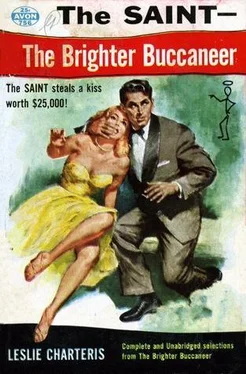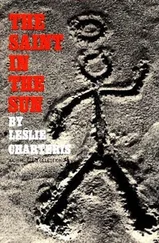Leslie Charteris - The Brighter Buccaneer
Здесь есть возможность читать онлайн «Leslie Charteris - The Brighter Buccaneer» весь текст электронной книги совершенно бесплатно (целиком полную версию без сокращений). В некоторых случаях можно слушать аудио, скачать через торрент в формате fb2 и присутствует краткое содержание. Год выпуска: 1933, Издательство: Doubleday, Жанр: Детектив, на английском языке. Описание произведения, (предисловие) а так же отзывы посетителей доступны на портале библиотеки ЛибКат.
- Название:The Brighter Buccaneer
- Автор:
- Издательство:Doubleday
- Жанр:
- Год:1933
- ISBN:нет данных
- Рейтинг книги:5 / 5. Голосов: 1
-
Избранное:Добавить в избранное
- Отзывы:
-
Ваша оценка:
- 100
- 1
- 2
- 3
- 4
- 5
The Brighter Buccaneer: краткое содержание, описание и аннотация
Предлагаем к чтению аннотацию, описание, краткое содержание или предисловие (зависит от того, что написал сам автор книги «The Brighter Buccaneer»). Если вы не нашли необходимую информацию о книге — напишите в комментариях, мы постараемся отыскать её.
The Brighter Buccaneer — читать онлайн бесплатно полную книгу (весь текст) целиком
Ниже представлен текст книги, разбитый по страницам. Система сохранения места последней прочитанной страницы, позволяет с удобством читать онлайн бесплатно книгу «The Brighter Buccaneer», без необходимости каждый раз заново искать на чём Вы остановились. Поставьте закладку, и сможете в любой момент перейти на страницу, на которой закончили чтение.
Интервал:
Закладка:
"I gather," said the Assistant Commissioner, in his precise and acidulated way, "that we are to wait until this man Templar has made himself a millionaire, when presumably he will have no further incentive to be dishonest."
"I wish I could believe that," said Teal funereally.
He had a definite feeling of injustice about that interview, for on the whole the past twelve months had been exceptionally peaceful. Simon Templar had actually been on the side of the Law in two different cases, whole-heartedly and without much financial profit; and his less lawful activities, during the period with which Teal's report dealt, were really little more than rumours. Undoubtedly the Saint had enriched himself, and done so by methods which would probably have emerged somewhat tattered from the close scrutiny of a jury of moralists; but there had been no official complaints from the afflicted parties — and that, Teal felt, was as much as his responsibility required. Admittedly, the afflicted parties might not have known whom to accuse, or, when they knew, might have thought it better not to complain lest worse befall them; but that was outside Teal's province. His job was to deal in an official manner with officially recognised crimes, and this he had been doing with no small measure of success. The fact that Simon Templar's head, on a charger, had not been included in his list of offerings, however, appeared to rankle with the exacting Commissioner, who sniffed his dissatisfied and exasperating sniff several times more before he allowed Mr. Teal to withdraw from his sanctum.
It was depressing for Mr. Teal, who had been minded to congratulate the Saint, unofficially, on the discretion with which he had lately contrived to avoid those demonstrations of brazen lawlessness which had in the past added so many grey hairs to Teal's thinning tally. In the privacy of his own office, Mr. Teal unwrapped a fresh wafer of chewing gum and meditated moodily, as he had done before, on the unkindness of a fate that had thrown such a man as Simon Templar across the path of a promising career. It removed nearly all his enthusiasm from the commonplace task of apprehending a fairly commonplace swindler, which was his scheduled duty for that day.
But none of these things could noticeably have saddened Simon Templar, even if he had known about them. Peter Quentin, intruding on the conclusion of the Saint's breakfast shortly afterwards, felt that the question, "Well, Simon, how's life?" was superfluous; but he asked it.
"Life keeps moving," said the Saint. "Another Royal Commission has been appointed, this time to discuss whether open-air restaurants would be likely to lower the moral tone of the nation. Another law has been passed to forbid something or other. A Metropolitan Policeman has won a first prize in the Irish Sweep. And you?"
Peter helped himself to a cigarette, and eyed the Saint's blue silk Cossack pyjamas with the unconscious and unreasonable smugness of a man who has dressed for breakfast and been about for hours.
"I can see that I haven't any real criminal instincts," he remarked. "I get up too early. And what are the initials for?"
Simon glanced down at the monogram embroidered on his breast pocket.
"In case I wake up in the middle of the night and can't remember who I am," he said. "What's new about Julian?"
"He skips today," said Peter. "Or perhaps tomorrow. Anyway, he's been to the bank already and drawn out more money than I've ever seen before in hard cash. That's why I thought I'd better knock off and tell you."
Mr. Julian Lamantia should be no stranger to us. We have seen him being thrown into the Thames on a rainy night. We have seen him in his J. L. Investment Bureau, contributing to the capital required for buying a completely worthless block of shares.
If Mr. Lamantia had restricted himself to such enterprises as those in which the Saint's attention had first been directed towards him, we might still have been able to speak of him in the present tense. He had, in his prime, been one of the astutest skimmers of the Law of his generation. Unfortunately for him he became greedy, as other men like him have become before; and in the current wave of general depression he found that the bucket-shop business was not what it was. His mind turned towards more dangerous but more profitable fields.
Out through the post, under the heading of the J. L. Investment Bureau, went many thousands of beautifully printed pamphlets, in which was described the enormous profit that could be made on large short-term loans. The general public, said the pamphlet, was not in a position to supply the sums required for these loans, and therefore all these colossal profits gravitated exclusively into the pockets of a small circle of wealthy financial houses. Nevertheless, explained the pamphlet, as the hymn-book had done before it, little drops of water, little grains of sand, make the tiddly-tum-tum and the tumty-tum. It was accordingly mooted that, under the auspices of the J. L. Investment Bureau, sums of from £5 to £10 might be raised from private investors and in the aggregate provide the means for making these great short-term loans, of which the profits would be generously and proportionately shared with the investors.
It was a scheme which, in one form or another, is as old as some of the younger hills and as perennially fruitful as a parson's wife. Helped on by the literary gifts of Mr. Lamantia, it proceeded in this reincarnation as well as it always will. From the first issue of circulars thousands of pounds poured in, and after a very brief interval the first monthly dividend was announced at ten per cent — and paid. In another thirty days the second month's dividend was announced at fifteen per cent — and paid. The third month's dividend was twenty per cent— "which," a second issue of circulars hoped, "should remain as a regular working profit" — and the money was pouring in almost as fast as it could be banked. The original investors increased their investments frantically, and told their friends, who also subscribed and spread the good news. The dividends, of course, were paid straight out of the investors' own capital and the new subscriptions that were continually flowing in; but any suspicion of such low duplicity was, as usual, far from the minds of the innocent suckers who in a few months built up Mr. Julian Lamantia's bank balance to the amazing total of £85,000.
Like all get-rich-quick schemes, it had its inevitable breaking point, and this Mr. Lamantia knew. "Clean up while it lasts, and get out," is the only possible motto for its promoter; but a certain fatal doubt has often existed about how long it may safely be expected to last. Mr. Lamantia thought that he had gauged the duration to a nicety. On this morning whose events we have been following, Mr. Lamantia drew out his balance from the bank, packed it neatly in a small leather bag, and called back at his office. Perhaps that was a foolish thing to do, but his new secretary was a very beautiful girl. It was Saturday, and the week-end would give him a long start on his getaway. He had a new passport in another name, his passage was booked from Southampton, his luggage was packed and gone, his moustache ready for mowing: only one more thing was needed.
"Well," he said bluntly, "have you made up your mind?"
"I should like to come, Mr. Lamantia."
"Julian," said Mr. Lamantia attractively, "will do. Haven't you got a first name — Miss Allfield?"
"Kathleen," said the girl, with a smile. "Usually Kate."
The name meant nothing to Mr. Lamantia, who did his best to hold aloof from ordinary criminal circles. He said he preferred Kathleen.
"When do you go?" she asked.
"This afternoon."
"But you told me —"
"I've had to change my plans. I had a cable from Buenos Aires at my hotel this morning — I must get there as soon as I possibly can."
Читать дальшеИнтервал:
Закладка:
Похожие книги на «The Brighter Buccaneer»
Представляем Вашему вниманию похожие книги на «The Brighter Buccaneer» списком для выбора. Мы отобрали схожую по названию и смыслу литературу в надежде предоставить читателям больше вариантов отыскать новые, интересные, ещё непрочитанные произведения.
Обсуждение, отзывы о книге «The Brighter Buccaneer» и просто собственные мнения читателей. Оставьте ваши комментарии, напишите, что Вы думаете о произведении, его смысле или главных героях. Укажите что конкретно понравилось, а что нет, и почему Вы так считаете.












